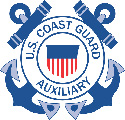 Date: June 12, 2005 Date: June 12, 2005
Contact: Aux. Wayne Spivak
Division Chief - External Communications
Public Affairs Department
United States Coast Guard Auxiliary
https://www.auxpa.org
516-353-9155
Media@auxpa.org
Local knowledge could have saved this boater much pain
Portland, ORE - The United States Coast Guard Auxiliary wants boaters to be extra cautious when boating in areas that are not familiar to them.
Local knowledge of both boating terrain and weather conditions can make all the difference between having a pleasant day on the water or it turning into a dangerous and possibly fatal ride.
Last Saturday, a couple in their 19 foot open boat with a Bimini went for a ride on the Columbia River. This was their first trip ever on this dynamic waterway. Along for the ride was the couple's two children, ages 11 and 3, as well as another female relative.
The Columbia River normally has calm seas during the day, but due to afternoon heating, the winds begin to kick up in the afternoon. By 5PM on Saturday, the winds were blowing about 15 knots and the seas were three foot chop.
Adding to the chop were the wakes caused by the many boats, most larger, that were coming back from a day on the water. This caused the chop to also have the characteristic of "confused seas", or waves coming from every direction.
Our boaters was neither prepared for this weather, nor used to boating in these weather and boating conditions. To their credit, they were wearing Personal Flotation Devices (PFD's).
The 11 year old female was sitting on the bow, when one particularly large wave hit the vessel.
She bounced and hit the deck head first.
Auxiliarists Ken Babick and Carol Bobo of Flotilla 73 of the Thirteenth Coast Guard Auxiliary District were on patrol that day and happened to be pass by the boaters shortly after the incident.
The 19 foot boat did not have a VHF radio, and was lucky that the USCG Auxiliary was patrolling that part of the Columbia River at that particular moment.
The Auxiliarists radioed ahead and requested an ambulance meet them at a local boat ramp. They then proceeded to lead the boat to the closest ramp. The Auxiliarists were later informed the child had broken her jaw in two places.
The Coast Guard Auxiliary can not emphasize enough the need for all boaters to:
1. Take a Boating Safety Course
2. Wear Your Lifejacket
3. Get a FREE Vessel Safety Check
4. Always file a Float Plan
5. If boating in unfamiliar waters, seek out local knowledge.
6. Always check the weather forecast before leaving and during the day.
For more information on Boating Courses, contact your local Flotilla (www.cgaux.org/cgauxweb/getzip.html) or Coast Guard unit (www.uscg.mil). For a Free Vessel Safety Check, contact the above, or use the VSC Examiner database https://safetyseal.net. For a on-line step by step Float Plan, visit Float Plan Central https://www.uscgaux.org/~floatplan/.
#### |

